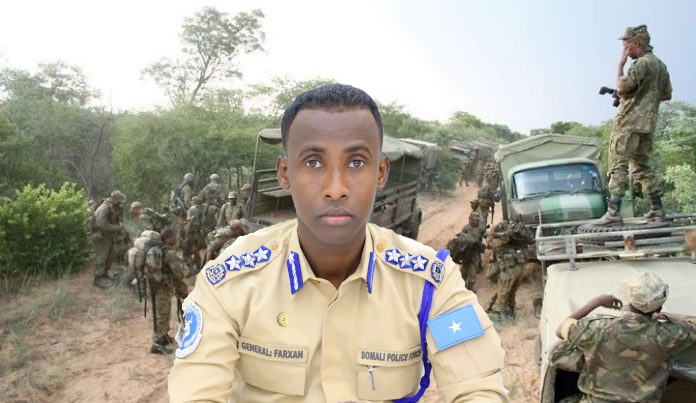
The Somali nation is reeling as General Farhan Mohamud Aden, popularly called Farhan “Qaroole”, was laid to rest in a Mogadishu cemetery yesterday. The emotion was very high as mourners recount his young age, his untainted professional records, and his gentle personality.
General Farhan had been Banadir’s police chief since replacing his disgraced cousin and superior, Sadaq “Joon” Omar Hassan, who staged a mutiny in support of the opposition in April 2021 during the bitter electoral stalemate.
In addition to being the police chief of the Banadir region, he retained his former position as commander of the Haram’ad (cheetah in Somali) police unit. This Turkish-trained tactical unit operates wherever needed in Somalia and has been hailed for its proven effectiveness, particularly in defeating the Kenyan-funded cross-border militia.
Farhan Qarole was promoted to general last December by President Mohamed Abdullahi Farmajo for his tremendous work in securing the Banadir region and other regions, from Mudug to Gedo, against Al-Shabab, Ahlu-Sunna-Wa-Jama’a and other criminal militias.
He was killed by a landmine on Friday morning while on his way to meet Mahad Salad, the director of the National Intelligence and Security Agency (NISA) in Bal’ad, Middle Shabelle. Mahad Salad wanted help from Farhan who had just returned from a trip to Turkey in an operation against Al-Shabab in the region.
On his way to Bal-ad, the director of NISA called him to tell him to change his route and meet him in Basra, Lower Shabelle, instead. This last-minute route change may have had an impact for some, although Al-Shabab was cleared from the area earlier and a convoy took this route just before Farhan’s convoy was hit.
Many versions of how he was murdered circulate in the news. According to some sources, he had left his armored vehicle in Mogadishu. There are also other reports that he had his armored vehicle but his convoy stopped after changing its route to Basra and he got out of his vehicle for an unknown reason. It was then that he stepped on a landmine and was killed along with his aide.
There has been no known investigation conducted so far and people are still in the dark as for the exact circumstances of his last minutes. The National Police chief, General Abdi Hassan Hijar, and other security officials did not give a clear response to public’s demands for an independent investigation.
The young general, due to his position, had obviously a lot of enemies. He previously escaped two assassination attempts in July last year and in May, just days before the presidential elections.
Last year, many opposition politicians, including Mahad Salad, attacked him for his loyalty in line with his professional duties and his refusal to emulate his mutinous cousin.
At that time, current President Hassan Sheikh Mohamud urged him to side with the opposition and join his clan militia against his superiors in the Farmajo government if he was to grow old. A veiled threat, for which Hassan Mahamud never apologized.
Moreover, Farhan Qarole’s stellar records in clearing Al-Shabab hotel sieges took a hit last August in the Hayat Hote attack when Mahad Salad, a politician with ties to Al-Shabab and no prior experience in security, took the lead and botched the whole operation.
The Haram’ad unit led by General Qarole was eventually called to put an end to the siege after almost two days but that left a gaping crack between political leaders and professional security officials. Since then, there were calls within the government to replace him and his superior, General Hijar.
NISA has recovered all evidence, including CCTV footage, of the Hayat Hotel attack and the victims are awaiting the outcome of any investigation. The police were dissuaded from investigating and Parliament declined to probe NISA’s damaging involvement in the operation which claimed the lives of at least 30 civilians.
However, many wonders if Farhan Qarole had anything related to the hotel case that would incriminate the controversial NISA director. The Somali public is wary of these corrupt politicians and an Al-Shabab infested government using their positions to exact revenge against senior security officials loyal to the previous government and taking every opportunity to politicize the security sector.
Additionally, it is understood that the success of the ongoing operation in Hiraan could be a plausible motive for the elimination of Farhan Qarole as his Haram’ad unit is a centerpiece of the effort. Some politicians are trying to slow the push against Al-Shabab by demotivating the security forces. Already at the news of the young general’s murder, the distraught Haram’ad unit withdrew from the front line.
Similarly, all segments of Somali society reacted emotionally to the tragic loss of their hero. He was seen as a beacon of hope for a country marred by instability and foreign interference. Farhan was rescued from the clutches of Al-Shabab and became an example for young Somalis who grew up in the civil war and never experienced a united and stable Somalia.
Former NISA Director Fahad Yasin described him as “a young boy who was short, thin, and open-minded, very happy (as his name suggests), by nature kind, visionary, quiet, well organized, loyal to his country and his leaders. He added that he gave his blood and sweat defending the dignity and existence of the Somali nation.
General Farhan was mostly on the front line whether leading a fight against terrorists and other criminal organizations or working with the people and his superior to improve the national security. He was one the rare officials who did not spend his time meeting foreign diplomats in Halane.
Besides all of Somalia, he will miss his soldiers with whom he had a close relationship and the people of Mogadishu, more than any other people. Naming the Haram’ad center after him is a way, according to General Hijar, of remembering his incomparable contribution for generations.
